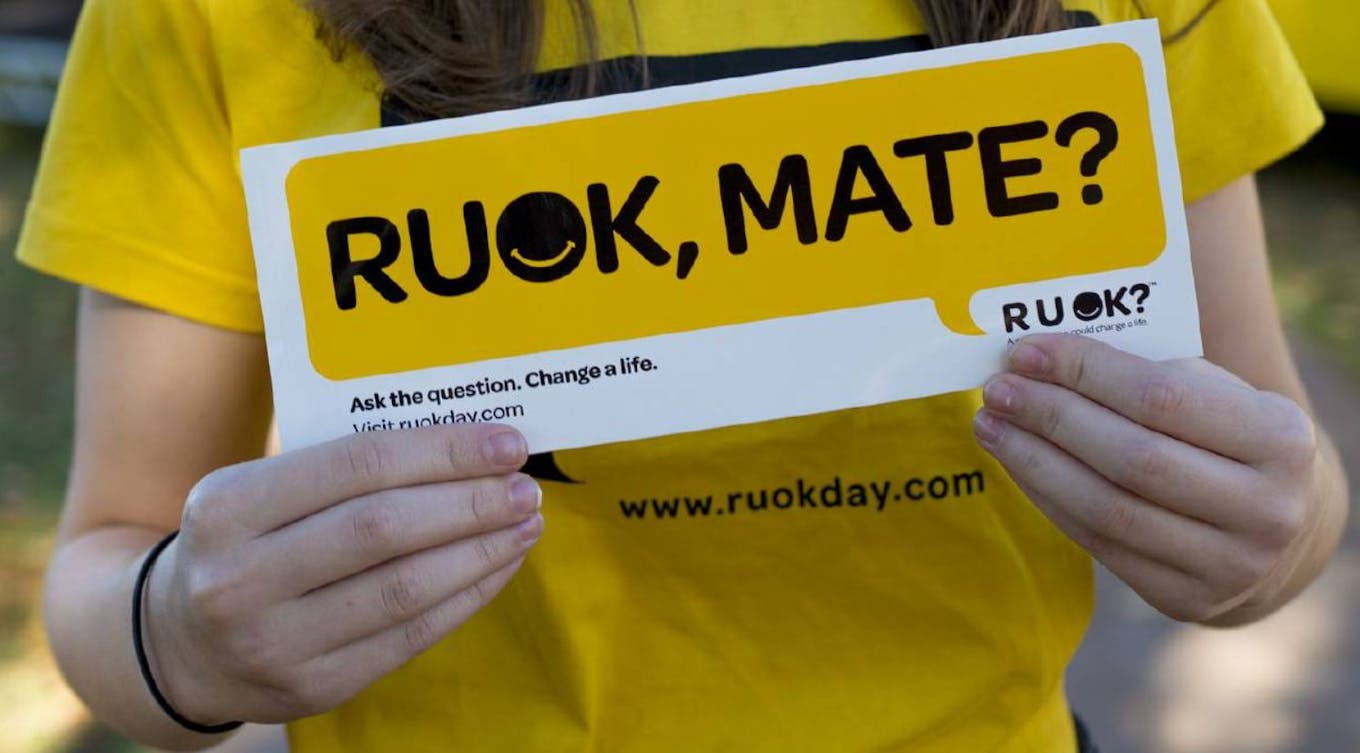In June last year, an analyst from S&P Global Market Intelligence told an audience of investors and business owners that workplace wellbeing — defined as the overall mental, physical, emotional, and economic health of employees — would domininate the social aspect of ESG [environmental, social, and governance] issues and risks for companies.
To continue reading, subscribe to Eco‑Business.
There's something for everyone. We offer a range of subscription plans.
- Access our stories and receive our Insights Weekly newsletter with the free EB Member plan.
- Unlock unlimited access to our content and archive with EB Circle.
- Publish your content with EB Premium.
But it has taken a pandemic for the corporate world to take the psychological welfare of their own employees seriously, says Enoch Li, who runs a workplace mental health social enterprise in Beijing, China.
Covid has given the corporate world a “massive, collective wake up call” to the importance of not only physical but mental health, says Li, who suffered from burnout and depression when she was a high-flying international banker, working in Tokyo, Paris, London and Beijing.

Enoch Li, a former banker, is founder of mental health therapy social enterprise, Bearapy. Image: Enoch Li
“I remember my boss telling me to slow down, take a break, go home early. But I said, no, I’m 26, I can deal with it. It took a jolt for me to realise that my body and mind were shutting down, I was ill — I needed to look after my mental health.”
Li tried to ignore the frequent colds, stomach aches, nausea, migraines and fainting that resulted from overwork. “I was rushed to hospital, because I almost fainted — and I was still on my Blackberry. I equated being sick as weak, as a failure. I think that had to do with my upbringing in Hong Kong, and being in a male-dominated industry,” she says.
“One day I started visualising drowning myself in the bathtub. That’s when it dawned on me that something’s not right,” she says. Li was diagnosed with severe clinical depression in 2009.
Covid has given businesses a similar jolt on a larger scale, Li says, because so many employees have experienced stress, anxiety and depression over the past two years.
Studies have shown a rise in loneliness and mental distress in employees working from home, and unprecedented levels of depression, anxiety, and post-traumatic stress disorder among staff as the pandemic has dragged on.
“Suddenly, mental health matters to all of us. Before it was more a case of an individual suffering, so it could be swept under the carpet. Now there’s no running away from it,” she says.
But opening up about mental health is still difficult for companies and their employees. Li has helped to steer the workplace mental health conversation in China at a time when the topic is still considered taboo.
Chinese tech companies including Pinduoduo, Tencent and Alibaba have faced public criticism after employees have taken their own lives. Critics have blamed the deaths on the industry’s harsh working conditions and “996” culture; working from 9am to 9pm, six days a week.
“There’s huge reputational risk from poor mental health,” says Li.
Poor mental health is believed to have serious economic implications. The direct and indirect costs of mental ill-health are estimated to eat into four per cent of global GDP a year — more than the cost of cancer, diabetes, and chronic respiratory disease combined.
Poor mental health cost employers US$2,000 per employee per year from absenteeism, leaveism (improper use of leave), presenteeism (employees coming to work when they shouldn’t), and unnecessary staff turnover. By 2030, mental illness is expected to cost the global economy US$6 trillion a year.
In this interview, Li tells Eco-Business why she started Bearapy, her social enterprise, how Covid-19 exposed mental health as a serious part of the S in ESG, and the question people can ask prospective employers to ensure a new workplace is a supportive environment.
What prompted you to start Bearapy?
Bearapy didn’t start as a company. It evolved after I experienced burnout and started talking about my experience.
I decided to quit my previous job because I needed a clean break. My former bosses had been very supportive after I took time off work [due to depression], and wanted to find another position for me. But it was very difficult to tell them what I had gone through. I felt guilty for not being able to do my job. I was more worried about disappointing my bosses and mentors than my own health.
After I left [the bank], I studied organisational development, and on the side I started talking about mental health and writing about my experience. I would offer to talk to companies in Beijing and Singapore for free about mental health. They would say, we don’t think we can talk about that in the office, but can you do a talk about positivity and how to be happy?
The mindset has really shifted since then. Now mental health is a topic in its own right. More companies are taking a long-term approach to mental health. They want to know how it affects their employer value proposition. As it evolves, the question is how mental health will be integrated into in the S in ESG. It will need to be accounted for in the boardroom, but there’s still a long way to go.
What sort of impact has Covid had on workplace wellbeing as a corporate priority?
Covid was a tipping point. Suddenly, companies had a much larger proportion of their employees experiencing similar problems, such as anxiety, depression and worries about their health. These concerns reached an intensity that nobody, from the bottom to the top, could deny, whereas before these issues were easier to sweep under the carpet.
Previously, the focus of efforts to improve employee wellbeing was on how to prevent burnout — with yoga classes, healthy snacks, team socials and the like. But a yoga class every quarter doesn’t address the crux of the issue — that the environment and structure of work is what is causing burnout. After Covid, there was a shift to consider how to address workplace wellbeing systemically.
What were the weaknesses that Covid exposed in how companies treat their employees?
Research by the likes of McKinsey and Deloitte has shown that the top reason why people leave their companies is because of their managers — either they don’t like them, they don’t get along, or the manager is mistreating staff.
During Covid, I really saw a difference in how our clients dealt with the situation. The managers who were already empathetic and caring were happy to be flexible, with work from home and other measures. They could talk to their teams about how to work through the problem together.
But those who weren’t caring were really thrown off by Covid, and couldn’t get their team together. They couldn’t suddenly say, we need to check in with each other and talk about how we’re feeling, because there was no sense of trust within the team.
The buzzword of the moment in workplace wellbeing is psychological safety. There is a misconception that this means that an employee is comfortable and happy, and their manager is nice. Actually, it’s about whether an employee can be open about what they’re going through mentally without repercussions for their job security.
Can we make mistakes in this working environment? Can I tell my manager that I’m stressed out and not worry that I’ll lose my job? Psychological safety is about having the confidence that your voice is valued, according to Amy Edmondson, Novartis Professor of Leadership and Management at the Harvard Business School, who coined the term.
What sort of progress do you feel the corporate world is making at recognising workplace wellbeing as a serious ESG issue?
I don’t think companies have fully recognised the importance of mental health. Historically, the S in ESG has focused on occupational risk and physical safety rather than mental health, but studies during Covid advocate that workplaces should expand the notion of health and safety to include both physical and mental health.
One problem is that mental health is hard to measure, as it is a subjective experience. What should a company track? Insurance, medical costs, absenteeism? Does a company know that high staff turnover is due to the poor mental health of employees? And how do we track it without infringing on privacy?
How does mental health affect company performance?
There is a definite correlation, as studies have shown. But it is harder to draw a direct causation — because the mental health of employees can be affected in so many additional ways than just work hours, and company performance is based on other factors.
When Microsoft in Japan introduced a trial for a four-day working week, there was a lot of hype [according to Microsoft, productivity jumped by 40 per cent]. Research by World Economic Forum finds that a US$1 investment in employee wellbeing gives a US$4-9 return to the company, in terms of staff retention and reduced medical insurance costs.
Your company, Bearapy, uses playfulness and the strength of our inner child to promote emotional and mental wellbeing. How hard is it to get people to open up and be honest about mental health in the workplace?
It is hard if we want people in Asia to open up to the same extent as, say, their American or British counterparts. This is a generalisation, but the workplace for a lot of Chinese people is just work: ‘I go there to work, I draw a line, and I go home.’ In the US, for instance among some of the youngest Silicon Valley startups, they promote work as your home, your family. I personally don’t want to see work as my home.
We need to be sensitive to culture. I wouldn’t force people in my workshops to tell their [personal mental health] stories on stage. But I think companies sometimes use people in Asia not wanting to open up as an excuse for inaction.
We did some research that asked Chinese people in random workplaces if they would tell their manager if they had a mental health condition. Their response was, yes, we should talk about it — but not at this company. So, if the conditions are right — despite being Chinese and not wanting to lose face — people will still talk about mental health to some extent.
Companies need to define for themselves the appropriate level of opening up for their staff. Do you want people crying and wiping back their tears? That’s one kind of culture. Another type enables people to talk about their mental health if they want, and not to if they don’t want to.
What are some of things companies can do to promote better mental health at work?
Employers need to provide a cushion. Structures and policies should be in place for crisis; hospital insurance, an employee assistance programme, and sick leave for depression and other mental illnesses allowed for in their contract.
When those people off sick come back to work, they may need extra care; for instance, a lighter workload in the beginning. And employers should be aware that if somebody is in a shaky state of mind they can behave differently. Maybe they’re not rude, they are just depressed.
Also, employees need to be responsible for their own psychological safety. If you don’t open up, why would you expect somebody else to open up to you?
How vulnerable are sustainability-related organisations to burnout?
From my experience working with non-governmental organisations (NGOs) and running a social enterprise myself, I can relate to the idea of people throwing themselves into the work. We work and live for where we think there is meaning. The work is tied to our identity. Studies have shown that entrepreneurs are far more likely than white-collar workers to experience burnout.
Also, NGOs don’t usually have the same structures as private sector organisations to deal with mental health. And while NGO bosses may be good at what they do, they are not always good managers or leaders, and lack the funding for leadership development programmes. Issues with team conflict arise from poor leadership, because staff just don’t know how to be with each other, and work with each other.
Who’s doing a good job at taking workplace wellbeing seriously?

Australia’s R U Ok? is a suicide prevention non-profit founded by Gavin Larkin in 2009. Larkin’s father took his own life in 1996.
Canada is one of the few countries to have a government commission on workplace mental health. Australia has been good at promoting mental health in the community [with initiatives like R U Ok? day]. In the UK, there have been encouraging business-led efforts, such as the Global Business Collaboration on Workplace Mental Health, which was founded by firms including HSBC and Unilever.
What about companies?
There’s been a lot of work from by Western multinationals to communicate the importance of workplace wellbeing, and Fortune 500 CEOs have spoken out about it. But my question then is, how much of these good intentions get implemented on the ground here in Asia?
A few companies have been particularly progressive. One is Bloomberg. Alisha Fernando is their Hong Kong-based head of diversity and inclusion for Asia Pacific. They’re not just thinking about mental health in a silo. They are training people about privacy, and setting ground rules on privacy before they ask people to open up about mental health. And the high use of its ‘employee assistance programme’ is seen as a positive, showing the firm that their employees are not holding back from getting the support they need for their mental wellbeing.
Another is Visa in Singapore. They’re thinking about psychological safety very systematically. They can see that conversations about it require looking into the company culture. So they’re equipping managers and staff with how to tackle the issue together — not as theory — but asking what kind of behaviours they want to see collectively. This approach digs underneath the surface issues. It’s not just about solving mental health and burnout, but looking at the mentality of individuals; what are their fears? What are their values? What are the company values? How do we engender a sense of empathy and belonging, and not just because it’s a nice motto and a tagline?
What are the signs to look out for in people who are suffering from mental health problems at work?
If somebody who used to be sociable and extroverted suddenly disappears and doesn’t talk much for a period of time, that’s a sign. But depression is a collection of symptoms over time, not just someone feeling down for a day. I would encourage people reaching out to their colleagues to not only ask if they’re ok. Ask if they’re really ok, and take an extra two minutes to talk to them.
If you’re interviewing a prospective employer, what are the best questions to ask to make sure you’re not walking into a mental health disaster zone?
Ten years ago, I’d be very scared to ask this question, but now I would ask the interviewer: ‘I experience depressive episodes every now and again — how would you deal with it?’ Their response will tell you immediately how much the company infuses the idea of mental health into the company culture.
This story was edited for brevity and clarity.










